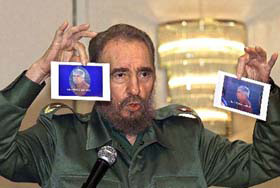 |
 |
 |
 News from Around the Americas | July 2005 News from Around the Americas | July 2005  
Judge Cites Terror Concerns, Rules Posada Must Stay in Jail
 Oscar Corral - The Miami Herald Oscar Corral - The Miami Herald


| | Cuban President Fidel Castro holds up photos of Cuban-Venezuelan Luis Posadas Carriles during a press conference in Panama City on the sidelines of the Ibero-American summit. Castro named Carriles as the mastermind of an alleged terrorist plan to assassinate him during the Panama summit. Panama's President Mireya Moscoso on 26 August 2004 pardoned Posada Carriles and three other Cubans convicted in a plot to assassinate Fidel Castro. (Photo: Xinhua/AFP) |
El Paso - An immigration judge on Monday rejected a request by Luis Posada Carriles to be released on bond, ruling the Cuban exile must remain in detention until his case is resolved.

Judge William L. Abbott cited allegations that Posada is a terror suspect and concerns he would flee if granted bond.

Listing a series of terror allegations against Posada over the years, Abbott said even Posada's participation in operations against Cuba in the early 1960s could be considered terror under today's standards.

Abbott's statement seemed to catch by surprise Posada's lawyer, Matthew Archambeault, who interpreted it to mean the judge would include the Bay of Pigs invasion - sponsored by the US government - as an act of terror under today's definition of terrorism.

"It doesn't necessarily matter who helped it," the judge said, in response. "The question is whether that kind of activity today would be defined as aiding terrorism or participating in acts of terrorism."

A former CIA operative, Posada played a role in the ill-fated Bay of Pigs operation but was not part of the invasion force itself. Afterward, Posada joined the CIA and participated in post-Bay of Pigs CIA-backed Cuba operations before moving to Venezuela in the late 1960s. In Caracas, Posada served as a senior Venezuelan security officer and later operated a private security agency.

He was arrested and charged in connection with the blowing up of a Cuban jetliner in 1976 that killed 73 people. Acquitted by a military court, Posada escaped from a Venezuelan prison in 1985 before a civilian court could reach a verdict.

Posada was detained in Miami-Dade on May 17 and accused of entering the country illegally. He was sent to a detention facility in El Paso.

Posada showed up at his second court hearing since his detention with his face heavily bandaged from skin cancer surgery. He seemed to be wearing a bullet-proof vest underneath his red government-issued jump suit.

Archambeault told the judge he planned to renew his request to transfer Posada's case to Miami, citing Posada's skin cancer. Archambeault also dropped Posada's contention that he is still a US resident, noting that his client was withdrawing that claim because he didn't want to add peripheral issues to the case.

Another issue Abbott cited was Venezuela's extradition request for Posada. He said that according to US law, a person detained in the United States for being illegally in the country and who is suspected of terrorism in another country must remain in custody.

The judge rejected a request by Posada's lawyers to throw out the government's evidence against Posada on the ground it's hearsay. Abbott said hearsay was admissible in immigration court.

Abbott said unless Posada openly insists on the witness stand that media reports about him are "not true," the judge would not suppress newspaper clippings that the government has included in its evidence package.

The judge came down hard on Posada. He said he would likely consider Posada's conviction in Panama on charges of possessing explosives as a valid prior criminal record barring him from admission to the United States - despite a Panamanian presidential pardon last year that enabled Posada and three other exiles to walk free after being arrested in connection with an alleged plot to kill Cuban leader Fidel Castro.

Under immigration law, a foreign pardon does not protect a foreign national from being denied admission into the country.

"The conviction does seem to exist for immigration purposes," Abbott said, adding: "He's here as an uninvited guest. . .There are potentially a number of different charges Mr. Posada can face."

The federal evidence against Posada also includes use of a false Salvadoran passport to travel to Miami in April 2000, six months before Posada used the same passport to enter Panama where he was arrested in the alleged assassination conspiracy. That issue was not raised Tuesday.

The immigration service's lead prosecutor in the case, Gina Garrett-Jackson, said Posada is subject to mandatory detention.

The next hearing in the case is scheduled for Aug. 29, when Posada's asylum trial is expected to begin. | 
 | |
 |



